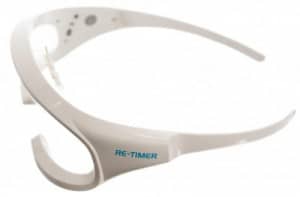 With all the flying I did in 2012 my new nickname could be Johnny Jetlag. That name might not stick though, thanks to Australian researchers who created the world’s first high-tech ‘time-control’ glasses that combat jetlag. The glasses work by emitting a soft green glow which is said to work on the human body clock to change our sleep patterns. Here’s the full story, and they cost just under $300.
With all the flying I did in 2012 my new nickname could be Johnny Jetlag. That name might not stick though, thanks to Australian researchers who created the world’s first high-tech ‘time-control’ glasses that combat jetlag. The glasses work by emitting a soft green glow which is said to work on the human body clock to change our sleep patterns. Here’s the full story, and they cost just under $300.
This post contains references to products from one or more of our advertisers. We may receive compensation when you click on links to those products. For an explanation of our Advertising Disclosure,
visit this page.





Where are the data? Why green? Certainly, the description of how the circadian clock works is inaccurate. The device looks nifty, but past research with such head-mounted devices, including for jet lag, was inconclusive. A bit pricey for a gadget that probably won’t work for most people. See http://www.psychologytoday.com/blog/chronotherapy/201301/light-therapy-the-wild-side.
I understand your scepticism, especially in light of the Valkee scam: http://www.earlightswindle.com/
But this does look like it was researched and some peer reviewed articles exist, although whether it is adequate or not, I can’t tell at this stage.
The research links are here: http://re-timer.com/physicians/research/
This includes the following references:
“Light emitting diodes can be used to phase delay the melatonin rhythm”
“Differential effects of light wavelength in phase advancing the melatonin rhythm”
“Morning blue light can advance the melatonin rhythm in mild delayed sleep phase syndrome”
“Effect of light wavelength on suppression and phase delay of the melatonin rhythm”
They have a final article on their site that is NOT peer reviewed but I believe they should do it. The fact that it is not is disappointing.
“Green light is effective in advancing the timing of sleep onset and increasing duration of sleep”
The peer reviewing journals include: Journal of Pineal Research (looks credible and reputable), Sleep and Biological Rhythms (don’t know it, couldn’t find anything on it) and Chronobiology International (very credible and reputable.)
The inventor is a Professor in Australia’s Flinders University. That university is reputable (top 10 in Australia).
I don’t work for any of these guys but have become a strong proponent of peer reviewing, and doing my own backup research, given how many scams and misinformation are out there these days. This device was recommended to me by my sleep specialist, who is a qualified Australian General Practitioner who got his degree from Melbourne University.